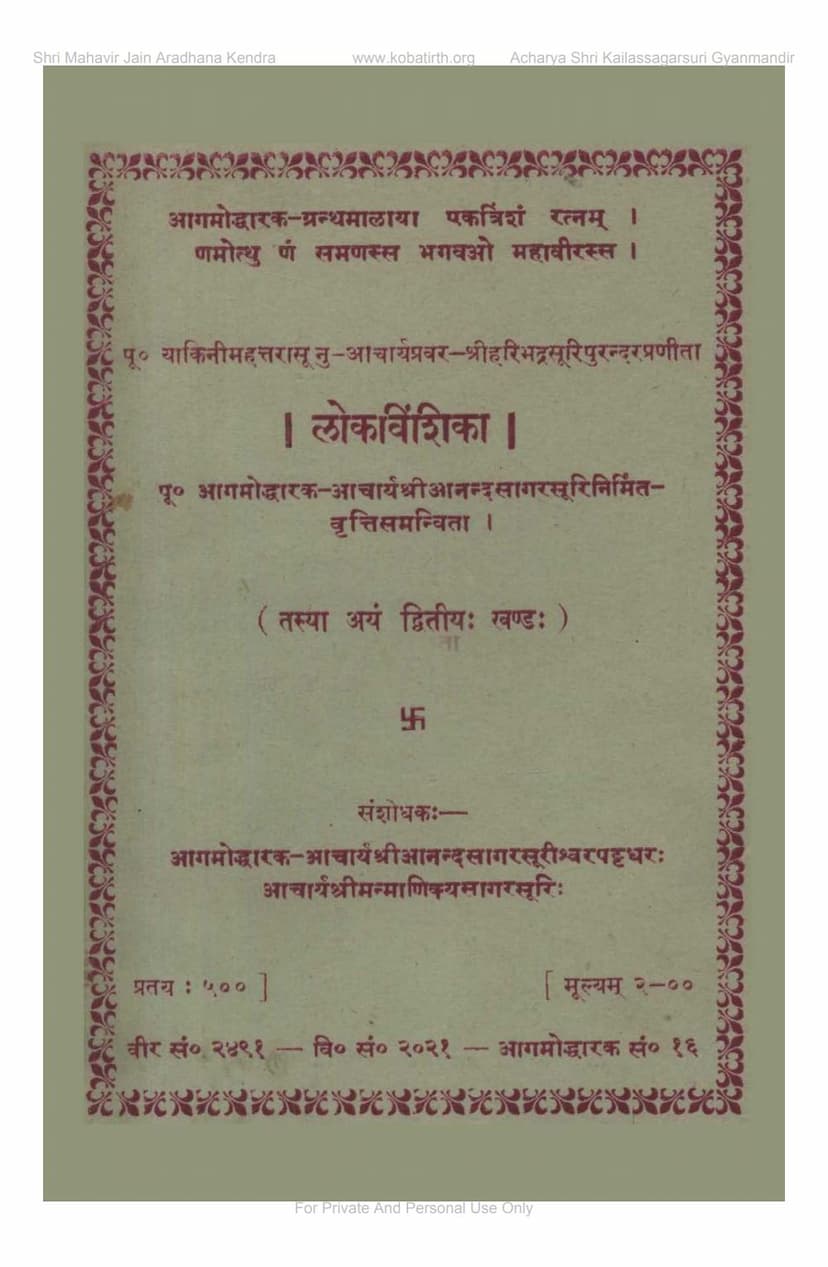Lokvinshika Part 02
Added to library: September 2, 2025

Summary
This document is the second part of the Jain text "Lokvinshika," authored by Acharya Shri Haribhadrasuri and commented upon by Acharya Shri Anandasagar Suri, with corrections and editing by Acharya Shri Manikyasagarsuri. The publisher is Agamoddharak Granthmala.
Key aspects covered in this part of the text:
- Continuation of the Lokvinshika: This is the second volume, suggesting the first part was previously published.
- Authoritative Lineage: The text highlights the lineage of Acharyas involved, indicating a tradition of scholarship and preservation of Jain scriptures. Acharya Haribhadrasuri is a highly respected figure in Jainism, known for his extensive works.
- Commentary and Editing: The presence of commentaries (Vritti) by Acharya Anandasagar Suri and the editorial work by Acharya Manikyasagarsuri suggest a detailed and scholarly approach to the original text.
- Missing Portion: Page 4 of the "Upakram" (Introduction) mentions that the commentary by Acharya Anandasagar Suri extends only up to the eighth stanza of the Lokvinshika. The portion thereafter is missing due to historical reasons, but the publisher decided to release the available commentary, having it compiled and corrected by Acharya Manikyasagarsuri, following the principle of "doing something is better than doing nothing."
- Purpose of Publication: The "Prakashakiy Nivedan" (Publisher's Note) on page 6 mentions the establishment of the Agamoddharak Granthmala inspired by Acharya Shri Manikyasagarsuri's guidance. This particular volume is the 31st publication of the Granthmala. It expresses gratitude to those who helped in its publication, including Muniraj Shri Saubagysagarji Maharaj and Muniraj Shri Labhsagarji.
- Content Summary (from the Subject Index, starting page 9): The Lokvinshika, as indicated by the extensive table of contents (from page 9 onwards), is a profound philosophical discourse. It delves into:
- The nature of the Universe (Loka): Discussing its composition (Panchastikaya), its eternal nature (Anadimata), and refuting creationist theories.
- The Five Existences (Panchastikaya): Detailed explanations of Dharma, Adharma, Akash, Jiva, and Pudgala, their characteristics, and their role in the universe.
- Theology and Creationism: Critically examines various creationist theories from different philosophical and religious traditions (like Samkhya, Puranic, Christian, Islamic) and refutes them from a Jain perspective. It strongly upholds the Jain view of an uncreated, eternal universe.
- The Soul (Jiva): Discusses the nature of the soul, its existence, the refutation of atheistic views regarding the soul, and its transmigration.
- Matter (Pudgala): Explores the subtle and gross forms of matter, its properties, and its role in various phenomena like sound, body formation, and sensory experiences.
- Language and Communication: Analyzes the nature of language, its various forms, and its connection to Pudgala.
- Metaphysics and Epistemology: Discusses concepts like causality, existence, proof (pramana), and refutes other philosophical schools' arguments.
- Critique of Other Philosophies: The text extensively engages with and refutes the philosophical viewpoints of various schools like Samkhya, Vedanta, Nyaya, Vaisheshika, Charvaka, and others, demonstrating the superiority of the Jain perspective.
- The Nature of Reality: Emphasizes the Jain principles of Anekantavada (non-absolutism) and Syadvada (conditional predication).
Overall Significance:
The Lokvinshika is a foundational text in Jain philosophy, aiming to establish the fundamental truths of Jainism, particularly the eternality and uncreated nature of the universe, the existence of the soul, and the refutation of God as the creator. This second part likely continues the detailed philosophical arguments and refutations initiated in the first part, making it a comprehensive exposition of Jain cosmology, ontology, and epistemology. The emphasis on logical reasoning and the critique of opposing viewpoints are central to its approach.